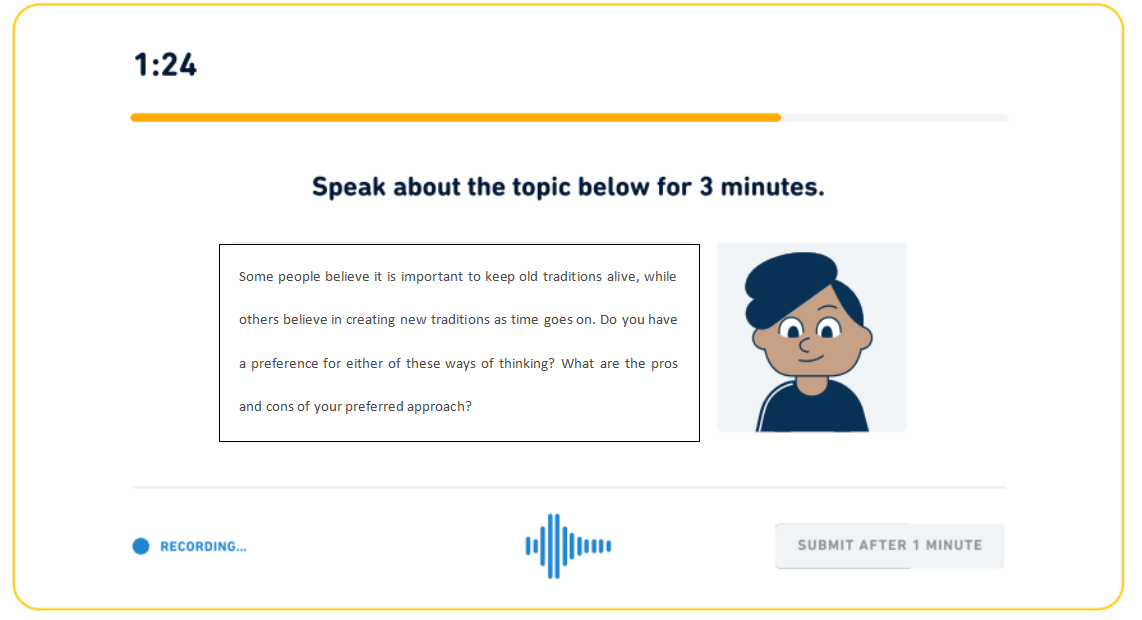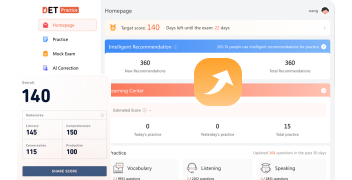DET Risposte a Domande di Alta Difficoltà: 'Campione di Parlato' (2024.10.24)
La sezione 'Esempio di Parlato' del Duolingo English Test (DET) richiede ai candidati di esprimere chiaramente le proprie opinioni su un argomento dato entro tre minuti. Questa sezione valuta la fluidità, l'accuratezza, la pronuncia, il vocabolario e la coerenza delle idee. Qui condivideremo strategie efficaci e risposte di esempio per aiutarti a eccellere in questa parte del test.

Strategie ad Alto Punteggio per il DET Esempio di Parlato
1. Comprendere l'Argomento e Pianificare Velocemente
Prima di parlare, prenditi un momento per comprendere appieno l'argomento e abbozzare una breve struttura. Un formato “punto, supporto, conclusione” funziona bene: inizia con la tua idea principale, segui con dettagli di supporto o esempi e termina con un breve riepilogo. Per le risposte narrative, utilizza un ordine cronologico per mantenere una risposta logica e facile da seguire.
2. Mantenere una Struttura Chiara e un Flusso Logico
Una struttura ben organizzata e un flusso logico aiutano il tuo ascoltatore a seguire la tua risposta. Ad esempio, quando ti viene chiesto di “describe an interesting travel experience,” organizza la tua risposta descrivendo il luogo, le attività e le impressioni in sequenza. Evita di saltare tra i punti o ripetere idee, poiché una risposta strutturata è più coinvolgente e più facile da seguire.
3. Utilizzare un Vocabolario Diversificato e Minimizzare le Ripetizioni
Nel tempo consentito, cerca di mostrare un'ampia gamma di vocaboli, in particolare utilizzando verbi, aggettivi e parole descrittive variate. Evita di ripetere termini di base come “good” o “interesting” e opta per sinonimi o termini più specifici come “fascinating” o “memorable”per aggiungere profondità alla tua risposta.
4. Assicurarsi Fluidità e Ritmo Naturale
Mantieni una moderata velocità di linguaggio, evitando discorsi eccessivamente lenti o correndo a causa dei nervi. Un ritmo naturale dimostra fluidità e piccoli errori non sono un problema se non interrompono il flusso della tua risposta.
5. Praticare Pronuncia e Intonazione
Una pronuncia chiara e un'intonazione naturale sono essenziali per un punteggio elevato. Ascoltare regolarmente parlanti nativi e imitare la loro pronuncia e intonazione, specialmente per parole chiave e finali di frase, può aiutare. Regolare il tuo tono per enfatizzare i tuoi punti può aggiungere fiducia alla tua risposta e renderla più coinvolgente.
Domande e Risposte di Esempio di Alta Difficoltà
L'Esempio di Parlato è una domanda a scelta oggettiva. Quando affronti questo tipo di domanda, i candidati dovrebbero adottare un approccio flessibile. Di seguito troverai due risposte avanzate. Se stai cercando ulteriore pratica, sentiti libero di controllare il video sottostante.
Domanda di esempio 1:

Risposta di esempio:
That's an interesting question, and it really got me thinking. I believe there’s significant value in both preserving old traditions and creating new ones.
On one hand, keeping old traditions alive helps us connect with our roots and provides a deep sense of cultural identity. Celebrating holidays like Thanksgiving and Christmas not only brings families together but also fosters a collective sense of unity. Additionally, preserving these traditions allows us to learn from the wisdom and experiences of our ancestors, passing down valuable knowledge through generations.
On the other hand, creating new traditions is essential for adapting to our ever-evolving world. New traditions embrace change and offer exciting opportunities for self-expression and creativity, reflecting our modern values and circumstances.
In conclusion, I believe it’s crucial to strike a balance between preserving old traditions and creating new ones. This approach honors our heritage while allowing us to embrace change and progress in our lives.
Domanda di esempio 2:

Risposta di esempio:
There are both positives and negatives to learning about different cultures through books, movies, and TV shows.
On one hand, these media can be a fantastic window into diverse worlds, offering snapshots of cultural practices and beliefs we might not otherwise encounter. For example, reading "Memoirs of a Geisha" provided an enthralling view of Geisha culture in Japan, almost like stepping into another universe.
However, these portrayals can also perpetuate stereotypes and offer skewed or overly romanticized views. Many Hollywood films depict foreign cultures through a narrow lens filled with clichés. You can’t truly understand a culture just by watching a movie.
Additionally, narratives often dominate from a Western perspective, which may not accurately reflect the experiences of people from different cultures.
In essence, while media can spark our interest in other cultures, it's vital to approach them critically and seek out diverse sources for a more holistic understanding.
Ulteriore Lettura:
l Corso di Preparazione DET: Domande di Esempio di Parlato
(Un articolo su un corso completo e esercizi sugli Esempi di Parlato.)
l 10 Vocaboli Avanzati per il “Campione di Scrittura” nel Duolingo English Test - Esperienza Personale
(Un articolo sui vocaboli avanzati per gli Esempi di Scrittura.)
l DET 5 High-Scoring Sample Answers: 'Esempio di Scrittura' (2024.09.28)
(Un articolo su Esempi di Risposte Ad Alto Punteggio per gli Esempi di Scrittura.)






